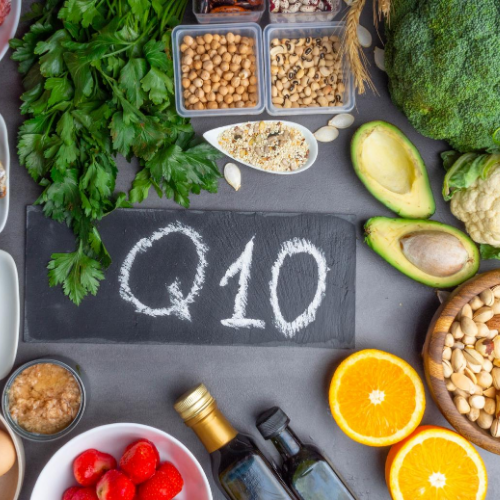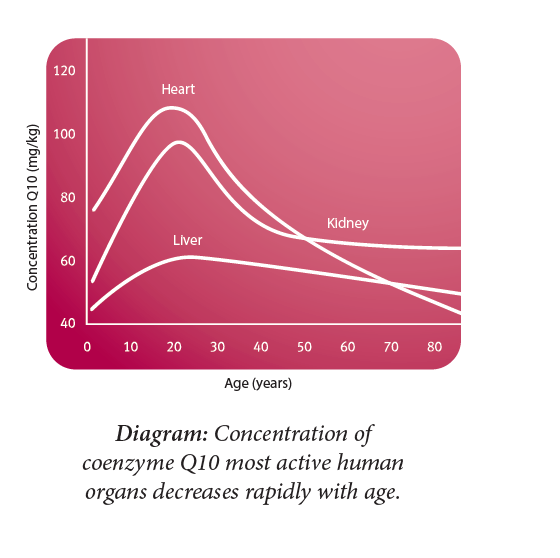
ABOUT COENZYME Q10
Coenzyme Q10 (CoQ10) is a fat-soluble molecule, present in every human cell.
It is crucial for energy metabolism and regulates processes which produce more than 95% of energy in our body. It is also an incredibly powerful natural antioxidant with an important role in fighting free radicals that damage our cells. As it one of the most important micronutrients in our bodies, we couldn’t exist without it.
Because of its role in energy production and antioxidant activity coenzyme Q10 offers a wide range of health benefits. In fact, coenzyme Q10 is so important that our bodies form it naturally our whole life. The “only” problem is that the endogenous synthesis of CoQ10 starts declining after the age of 20. The decline is especially significant in our heart and other key organs (100% at the age of 20; 68% at the age of 40 and 43% at the age of 80). The most noticeable consequences of CoQ10 deficiency are loss of energy and chronic fatigue.
HOW COQ10 WORKS?
Mitochondria is a part of the cell responsible for transforming nutrients into energy. The energy, formed in these “mini factories”, is crucial for sustaining energy to perform bodily functions. It is also necessary for converting “food into energy”.
CoQ10 has the ability to accept and donate electrons and this crucial feature helps it to cancel out dangerous free radicals. Additionally, it helps to recycle vitamins C and E, which means that it maximizes the efficiency of both of these powerful antioxidants in our bodies. The key advantage of CoQ10 lies in its presence in the mitochondria, the main source of free radicals. For this reason, it can be more effective than other antioxidants which are more evenly distributed throughout a cell.

UBIQUINONE VS. UBIQUINOL
“Is ubiquinol better than ubiquinone?” is one of the most common question for dietary supplements with CoQ10.
In short, CoQ10 is present in the human body in two forms: oxidized (ubiquinone) and reduced (ubiquinol) form. While ubiquinone is essential for CoQ10’s role in cellular energy metabolism, ubiquinol is essential for the antioxidant function of CoQ10. However, the form in which we consume it, does not affect its function. This was recently proven with a clinical study.
Ubiquinol shifts to ubiquinone during or following the absorption in the intestine. Consequently, the form does not affect its function. The key challenge is not in the form, but in the absorption of CoQ10, which is highly improved in Q10Vital®.
Continuous conversion between ubiquinone and ubiquinol (reduction–oxidation) takes place in vivo. Depending on whether CoQ10 is in the blood and lymph or inside the mitochondria of the cells, it shifts to the form that is needed in the particular situation. In blood and lymph, CoQ10 primarily serves as an antioxidant. In mitochondria, it supports the energy metabolism.
HOW MUCH COQ10 DO I NEED
Concentration of coenzyme Q10 in most active human organs decreases rapidly with age. CoQ10 intake with food is only 3-6 mg, which is clearly to low to compensate, as suggested daily intake of CoQ10 is:
- 50 mg for healthy people under the age of 50
- 100 mg for older people (after the age of 50), statin users, smokers and athletes
- 100 mg or more for people with risk factors

HOW MUCH COQ10 IS IN FOODS
Besides biosynthesis, small amounts of CoQ10 are supplied to the organism by various foods mostly from meat and fish.
The richest source of CoQ10 are organ meats (heart, liver and kidney), some muscle meats (pork, beef and chicken) and fatty fish (trout, herring, mackerel and sardine). Besides that, some vegetables (spinach, cauliflower and broccoli), fruits (oranges), legumes (peanuts) and nuts and seeds (sesame and pistachios) also contain CoQ10. Average intake of CoQ10 with diet is only 3-6 mg per day. Such an intake is not enough to compensate for age-related and disease-related decline of CoQ10. Therefore, daily supplementation of Q10 is recommended after the age of 30.
INTERESTED?
Contact us!
Valens Int. d.o.o.
Poslovna cona A35
4208 Sencur
Slovenia, EU


